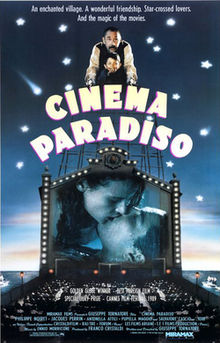So I wanted to do a bit of a short run of foreign language films for this period of 2016, last month I did La Haine and this month I decided to do Cinema Paradiso. This is one of the foreign language films I’ve always been interested in seeing but never got around too before now, the whole angle of this film being a love letter to classic cinema and the whole experience of the cinema being the main aspect that interested me. After seeing it, I have to admit that this was a brilliant, beautiful film about the power of cinema.
The film concerns Italian film director Salvatore Di Vitta who, one evening, gets a phone call from his mum saying that someone called Alfredo has died. Through flashbacks we see that Alfredo was the projectionist at the cinema in Salvatore’s home town, and we see the friendship that develops between Salvatore and Alfredo through cinema. This friendship is easily the best aspect of the film, the writing and the performances selling the nature of it, going from being tense, to Alfredo becoming a father figure to Salvatore, especially after Alfredo starts teaching Salvatore to operate the projector, the mentoring aspect reaching its pinnacle when Alfredo encourages Salvatore, who has already been experimenting with making his own films, to leave the village to follow his dreams, this being one of the best emotional moments in the film and the performances from Philippe Noiret and Marco Leonardi (along with Salvatore Cascio as the youngest Salvatore) making it work so well (despite the dodgy lip synching). The communal aspect of cinema is also something the film presents brilliantly. Whenever we see a film being played, the audience is always shown and this helps build up the character of the film, creating a very believable world for the film, we see people spitting from the balcony onto those lower down, jokes being played on moviegoers who have fallen asleep, and even a group of young boys having, shall we say a formative experience watching the women in one of the films. This also brings in the aspect of how dangerous the cinema was for a long time, partly due to the cinema only having one screen so there being the risk of a crush, but mainly due to the nitrate film used in cinemas in the 40s, which is highly flammable, a few scenes revolving around the danger that can be faced when this film stock is kept near heat for just a few seconds longer than it takes to run through the projector. The only aspect of the plot that I don’t think works as well is the romance. Don’t get me wrong, the scenes of the romance between Salvatore and Elena are brilliantly handled, the chemistry between Leonardi and Agnese Nano helping to sell the adolescent love and the direction of these scenes helps to create some iconic moments, but I felt there was something missing about this side of the film, something to wrap it all up and tie it in better to the plot at the end, although this could be because I watched the theatrical cut of the film and I know the extended edition has more scenes with Elena, so chock this up to a problem in the theatrical version only.
In terms of the beauty of the film, no aspect of the film embodies this more than the music by Ennio and Andrea Morricone. Now the first thing I experienced from this film, before I saw it, was the music for it when I saw it performed in a film music concert in Glasgow last year and I have to admit, I did end up crying because of how beautiful the music was, and hearing it in context with the film, matched up with the visuals, only confirmed my feelings about the music. This is easily one of the best musical scores ever composed. Praise also has to be given to the production design of the film, which does a great job at creating a classic cinema, the whole design of the Paradiso letting you know why the cinema became such a formative experience for Salvatore.
Overall, Cinema Paradiso is a brilliant film. Any of the issues that I have with the film feel more like they are due to the cut I watched and I’m sure that if I watched that version, my opinion of the film would be higher. Still, this is a film that understands more than any other film I’ve seen the power of cinema and the formative experience that cinema can have on people and for that reason, I think this film is essential viewing.
My Rating: 4.5/5

One thought on “2016 Blind Spot: Cinema Paradiso”